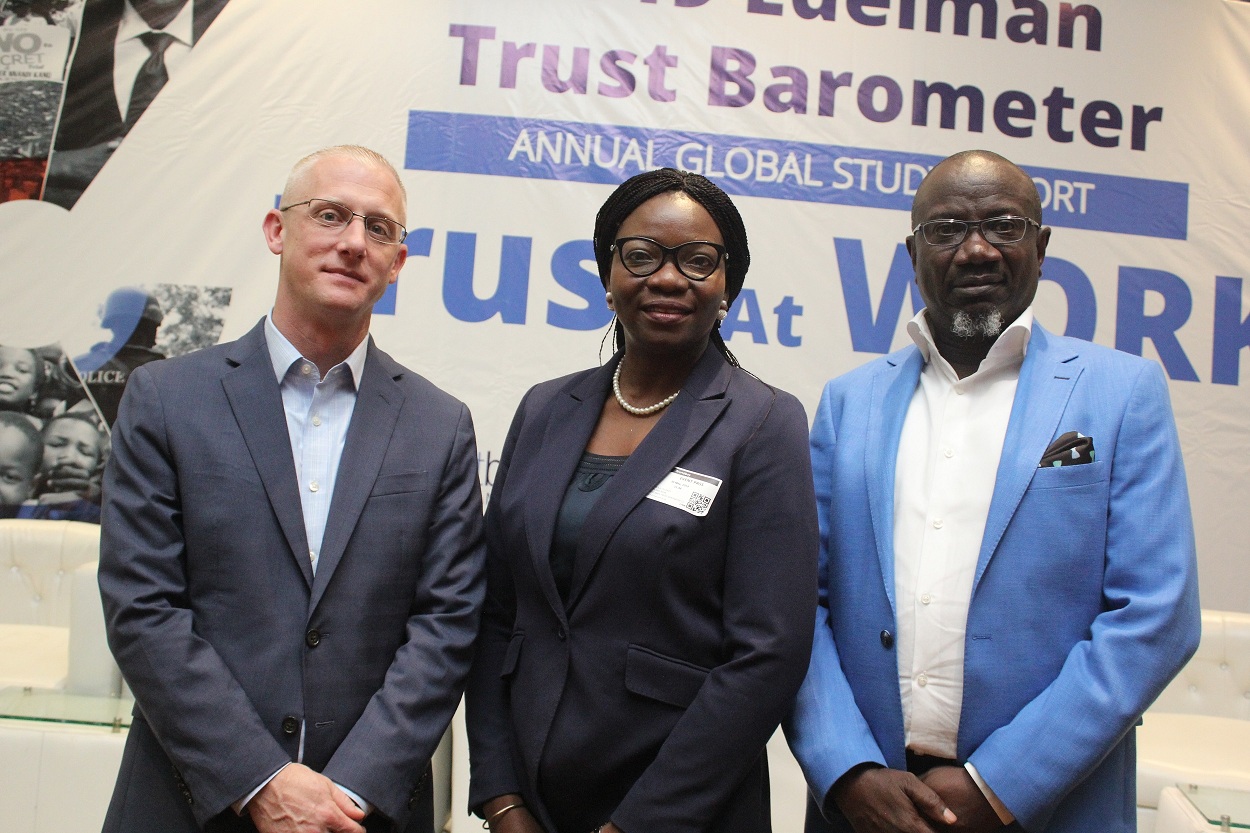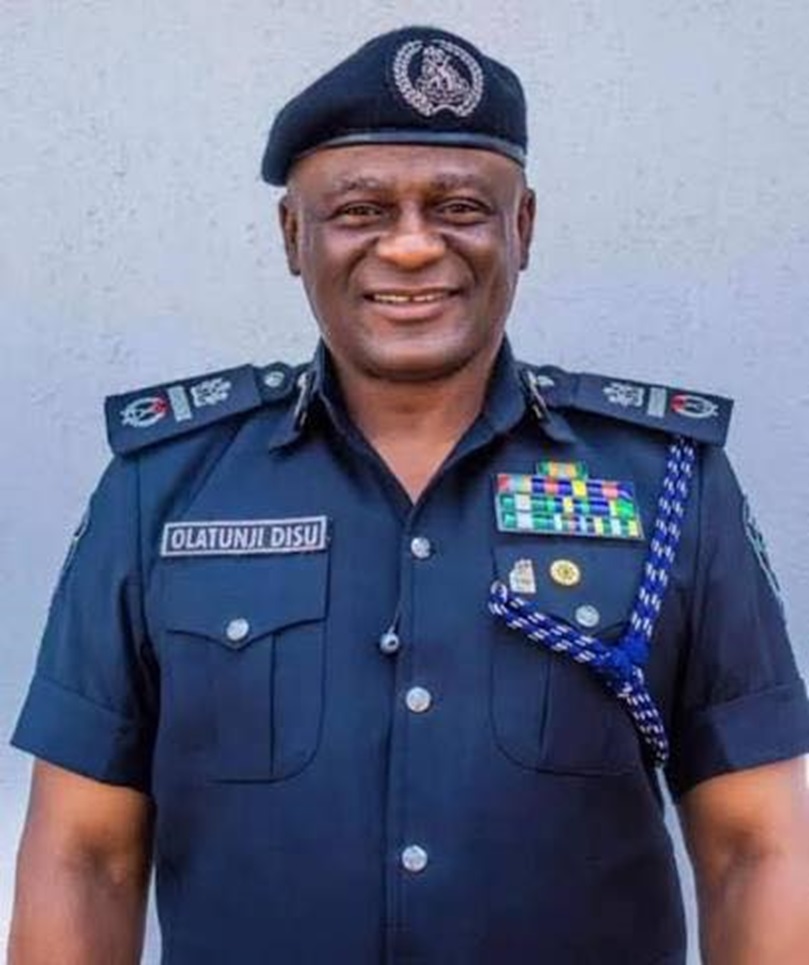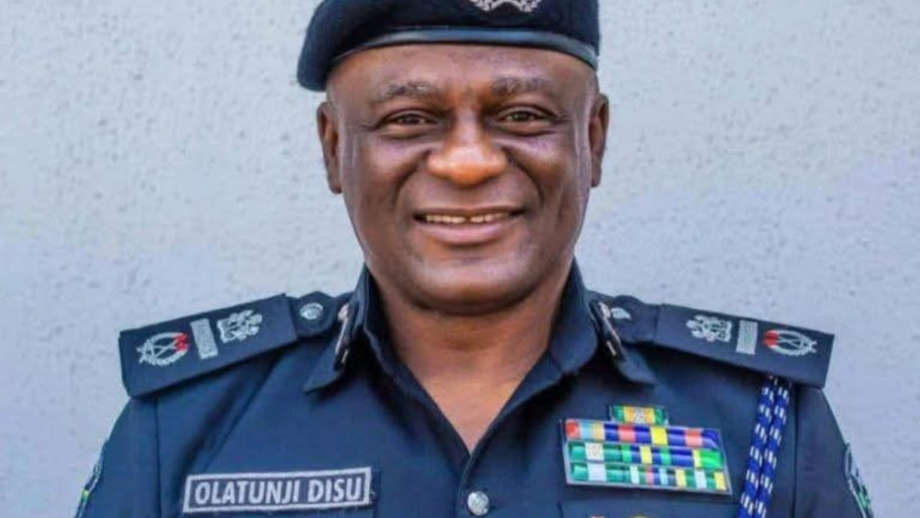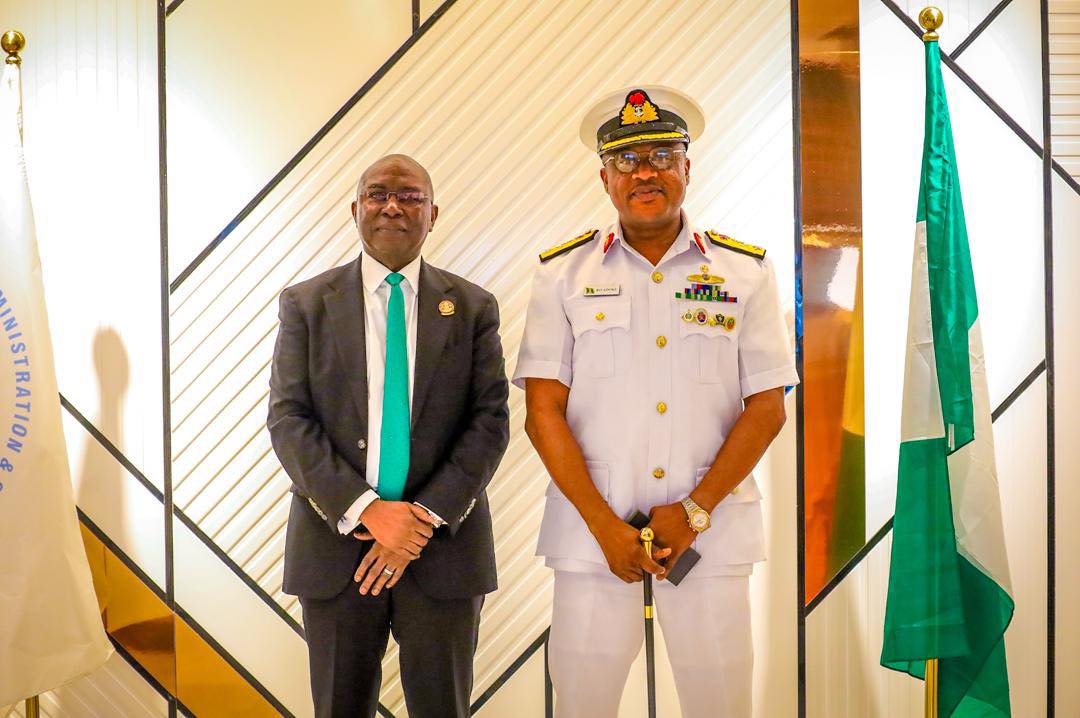Jobs/Appointments
Nigerians Trust Their Employers More—Report

A new report has shown that of the four mainstream institutions of government, business, media and non-governmental organisations, Nigerians trust more in business and believe that their employers should take the lead on change rather than waiting for the government to initiate it.
This revelation amongst others was contained in the 19th Edelman Trust Barometer Survey Report unveiled by Edelman and its Exclusive Nigerian Affiliate and the Preferred West African Partner, Chain Reactions Nigeria, in Lagos on Thursday, May 30, 2019.
Edelman Trust Barometer launched in 2001 is the annual global trust and credibility online survey conducted by Edelman Intelligence, the independent research arm of the Edelman global network, testing how well people trust the institutions of government, business, media and nongovernmental organisations to do what is right.
Presenting the data from the Nigeria Trust Breakout, Managing Director, Edelman Africa, Jordan Rittenberry, said, “Ninety-five per cent of respondents agreed that employers can create positive change in skills training, while 93 percent said that CEOs can influence economic prosperity in Nigeria. 88 percent agreed that their employers can create positive change in job creation while another 83 percent believed in the ability of their employers to initiate positive change in discrimination.”
The survey conducted by Edelman Intelligence between October 19 to November 16, 2018, further revealed that 72 percent of the Nigerian respondents see their employers as a trustworthy source on the global economy while 58 percent perceive business as a reliable source on technology.
Rittenberry added that, “Fifty-eight percent of respondents look to their employer to be a trustworthy source of information about social issues and other important topics on which there is not general agreement. A further 77 percent believe that a company can take specific actions that both increase profits and improve the economic and social conditions in the communities where it operates.”
He revealed further that trust across the four mainstream institutions in the country decreased by 24 percent from 2018 with a drop from 66 percent to 42 percent and that in Africa in general, trust fell four points from 2018 to 2019.
Rittenberry disclosed that in Nigeria and nine other African countries included in the survey, “government is the least trusted institution while trust in media amongst the 10 African countries exceeds the global average of trust in media at 47 percent. Business is the most trusted institution amongst the 10 African countries, while NGOs are trusted in six of the 10 African Markets.”
The 2019 Edelman Trust Barometer with the theme, ‘Trust at Work’, is the second exclusive deck on Nigeria, the first being that of year 2018 survey while this year also made it the third time the report was presented in Nigeria. 2017 was the first time the report was ever presented in Nigeria although Nigeria was not included in the study then. The other African countries surveyed are South Africa, Egypt, Ghana, Kenya, Morocco, Cote’d Ivoire, Ethiopia, Tanzania and Angola.
Speaking further, Rittenberry disclosed that for the media in Nigeria, search engines were the most trusted at 84 per cent followed by earned media (69%), social media (64%) and traditional media at 60%. Online media was the least trusted with 56 per cent.
“Trust in government is really low while trust in media is fairly balanced; business is the most trusted institution in Africa while trust in NGOs varies across the continent”, he said.
Earlier in his welcome address, Managing Director/Chief Strategist, Chain Reactions Nigeria, Mr Israel Jaiye Opayemi, affirmed that the importance of trust could not be over-stated, noting that trust played a key role in the last general elections and called on government to invest in its trust quotient.
“Trust is built by what we say as well as by what we do and so for a government like ours, perhaps this is an auspicious time for those who are responsible for managing the institutions of government in Nigeria to begin to think about investing in that asset of trust.
“My admonition to President Muhammadu Buhari and his Vice, Prof Yemi Osinbajo is to make a deliberate effort to earn the trust of Nigerians in their second tenure of four years.
“For them to earn our trust as Nigerian citizens, one of the things my experience has taught me on this job is, perhaps, we need to rethink the entire communication architecture of government once more. I ask that fundamental question, ‘in what way has the present architecture helped the government to earn the trust of the people?’ And President Muhammadu Buhari, our appeal (this morning) is that as you select the next set of ministers, you must reign them in. What we saw in the last four years was that there were too many people speaking for your government.”
To curb the increasing menace fake news in the media, Mr Opayemi suggested self-censorship for professionals. “Can we begin to do what our colleagues are doing in other countries? That weekly, we do a compilation of all the false stories and the fake news that newspapers have published or that TV and radio stations have broadcast and name and shame them. This is going on with a lot of impunity. Let us generate ideas on how to tame this monster that’s in our society,” he advised.
He also urged businesses and NGOs to invest in trust, noting that, “how well can businesses further invest in this asset of trust the same way they invest in machinery and other things?”
The highpoint of the presentation ceremony was a panel discussion featuring eminent professionals drawn from business, government, media and NGOs, who shared their perspectives on the report.
They included publisher of BrandCrunch, O’Lekan Babatunde; Assistant Director, Programmes, Radio Nigeria, Lagos Operations, Funke Treasure-Durodola; Coordinator, Campaign Against Impunity, Shina Loremikan and Executive Chairman, Centre for Anti-Corruption and Open Leadership, Debo Adeniran.
The others were former sole administrator, Eti-Osa East Local Council Development Area of Lagos State, Prince Babatunde Ayo Ayeni; Head, Brand Communications, SUNU Assurance Plc, Oluwayemisi Mafe and Bukola Oluyadi, Enterprise Transformation/Corporate Planning and Strategy, Polaris Bank Limited. The TV personality, Oscar Oyinsan, moderated the session.
Founder and chairman, Proshare Nigeria Limited, Mr Olufemi Awoyemi, in his brief keynote speech, said trust was paramount in all aspects of life and that trust issue is not only a Nigerian problem, but generally a common problem across human society.
Chairman, Nigerian Institute of Public Relations, Lagos State chapter, Mr Olusegun McMedal and President, Public Relations Consultants Association of Nigeria, (PRCAN), Mr John Ehiguese, also gave goodwill speeches at the event.
Mr McMedal expressed happiness that Nigeria was considered in the global report for the second time and noted that the report is perfect for Africa.
Jobs/Appointments
Tinubu Appoints Tunji Disu as Acting Inspector General of Police

By Modupe Gbadeyanka
President Bola Tinubu on Tuesday appointed Mr Tunji Disu as the acting Inspector General of Police (IGP), following the resignation of Mr Kayode Egbetokun.
Mr Disu, an Assistant Inspector General of Police (AIG), was recently moved to the Force Criminal Investigation Department (FCID) Annex, Alagbon, Lagos.
A statement today by the Special Adviser to the President on Information and Strategy, Mr Bayo Onanuga, disclosed that the President would convene a meeting of the Nigeria Police Council shortly to formally consider the appointment of Mr Disu as substantive IGP, after which his name will be transmitted to the Senate for confirmation.
Mr Tinubu expressed confidence that Mr Disu’s experience, operational depth, and demonstrated leadership capacity would provide steady and focused direction for the Nigeria Police Force during this critical period.
He reiterated his administration’s unwavering commitment to enhancing national security, strengthening institutional capacity, and ensuring that the Nigeria Police Force remains professional, accountable, and fully equipped to discharge its constitutional responsibilities.
Mr Egbetokun was said to have resigned from the position due to pressing family considerations.
President Tinubu, who accepted the resignation letter, expressed his profound appreciation for Mr Egbetokun’s decades of distinguished service to the Nigeria Police Force and the nation. He acknowledged his dedication, professionalism, and steadfast commitment to strengthening internal security architecture during his tenure.
Appointed in June 2023, Mr Egbetokun was serving a four-year term scheduled to conclude in June 2027, in line with the amended provisions of the Police Act.
The statement disclosed that his replacement was in view of the current security challenges confronting the nation, and acting in accordance with extant laws and legal guidance.
Jobs/Appointments
Tunji Disu to Become New IGP as Egbetokun Quits

By Adedapo Adesanya
Mr Tunji Disu, an Assistant Inspector General of Police (AIG), has reportedly replaced Mr Kayode Egbetokun as the new Inspector General of Police (IGP).
Mr Egbetokun resigned from the position on Tuesday after he was said to have held a meeting with President Bola Tinubu on Monday night at the Presidential Villa in Abuja.
President Tinubu appointed Mr Egebtokun as the 22nd IGP on June 19, 2023, with his appointment confirmed by the Nigeria Police Council on October 31, 2023.
Appointed as IGP at the age of 58, Mr Egbetokun was due for retirement on September 4, 2024, upon reaching the mandatory age of 60, but his tenure was extended by the President, creating controversies, which trailed him until his exit from the force today.
Although the police authorities are yet to comment on the matter or issue an official statement about his resignation, the move came amid reports suggesting that Mr Egbetokun has left the position.
Mr Egbetokun’s tenure was marred by a series of controversies; he recently initiated multiple charges against activist Mr Omoyele Sowore and his publication, SaharaReporters, after Mr Sowore publicly described him as an “illegal IGP.”
The dispute escalated into protracted legal battles, with the Federal High Court issuing injunctions restricting further publications relating to the former police chief and members of his family. Critics interpreted these court actions as attempts to stifle dissent and weaken press freedom.
His replacement, Mr Disu, was posted to oversee the Force Criminal Investigation Department (FCID) Annex, Alagbon, Lagos, some days ago.
Jobs/Appointments
NIMASA Gets New Maritime Guard Commander

By Modupe Gbadeyanka
A new Commander of the Maritime Guard Command has been appointed for the Nigerian Maritime Administration and Safety Agency (NIMASA), and he is Commodore Reginald Odeodi Adoki.
His appointment was approved by the Chief of the Naval Staff, Vice Admiral Idi Abbas, a statement from NIMASA confirmed.
He was chosen to replace Commodore H.C Oriekeze, who has been redeployed by naval authorities.
Commodore Adoki, a principal Warfare Officer specialising in communication and intelligence, brings 25 years of experience in the Nigerian Navy covering training, staff and operations.
As a seaman, he has commanded NNS Andoni, NNS Kyanwa and NNS Kada. It was under his command that NNS Kada undertook her maiden voyage, sailing from the country of build (the United Arab Emirates) into Nigeria.
He was commissioned into the Nigerian Navy in 2000 with a BSc in Mathematics. He has since earned a Master’s in International Law and Diplomacy from the University of Lagos and an MSc in Terrorism, Security and Policing atthe University of Leicester, England.
He is currently pursuing a PhD in Defence and Security Studies at the National Defence Academy (NDA). He is a highly decorated officer with several medals for distinguished service.
Welcoming the new MGC Commander to the agency, the Director General of NIMASA, Mr Dayo Mobereola, expressed confidence in Mr Adoki’s addition to the team, emphasising that it will further strengthen the nation’s maritime security architecture given his vast experience in the industry.
The Maritime Guard Command domiciled in NIMASA was established as part of the resolutions of the Memorandum of Understanding (MoU) with the Nigerian Navy to assist NIMASA in strengthening operational efficiency in Nigeria’s territorial waters, especially through enforcement of security, safety and other maritime regulations.
-

 Feature/OPED6 years ago
Feature/OPED6 years agoDavos was Different this year
-
Travel/Tourism10 years ago
Lagos Seals Western Lodge Hotel In Ikorodu
-

 Showbiz3 years ago
Showbiz3 years agoEstranged Lover Releases Videos of Empress Njamah Bathing
-

 Banking8 years ago
Banking8 years agoSort Codes of GTBank Branches in Nigeria
-

 Economy3 years ago
Economy3 years agoSubsidy Removal: CNG at N130 Per Litre Cheaper Than Petrol—IPMAN
-

 Banking3 years ago
Banking3 years agoSort Codes of UBA Branches in Nigeria
-

 Banking3 years ago
Banking3 years agoFirst Bank Announces Planned Downtime
-

 Sports3 years ago
Sports3 years agoHighest Paid Nigerian Footballer – How Much Do Nigerian Footballers Earn












